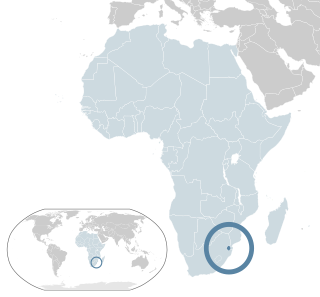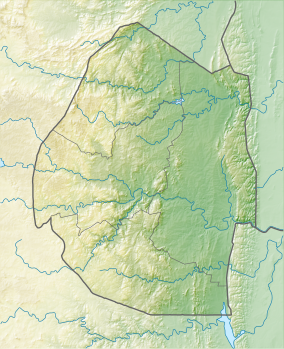
Eswatini, officially the Kingdom of Eswatini and also known by its former official name Swaziland, is a landlocked country in Southern Africa. It is bordered by Mozambique to its northeast and South Africa to its north, west, south, and southeast. At no more than 200 km (120 mi) north to south and 130 km (81 mi) east to west, Eswatini is one of the smallest countries in Africa; despite this, its climate and topography are diverse, ranging from a cool and mountainous highveld to a hot and dry lowveld.

Demographic features of the population of Eswatini include population density, ethnicity, education level, health of the populace, economic status, religious affiliations and other aspects of the population.
The economy of Eswatini is fairly diversified. Agriculture, forestry and mining account for about 13 percent of Eswatini's GDP whereas manufacturing represent 37 percent of GDP. Services – with government services in the lead – constitute the other 50 percent of GDP.

Mbabane is a city in Eswatini, and is one of the two capitals, serving as the executive capital.

Swazi culture is the way of life and customs of the Swazi people through various historical stages. The culture of Swazi people involves music, food, religion, architecture, and kinship, among many other things. The Swazi people are composed of various Nguni clans who speak the Nguni language siSwati. These people mostly reside in Eswatini and South Africa. Presently, Swazi people may also include citizens of Eswatini. In Eswatini, one of the most visible features of cultural identity is the traditional political structure of the nation and the home. In the national level, the Ngwenyama is considered the head of the nation alongside the Ndlovukati who is the spiritual leader of the nation. National cultural events often involve the Ngwenyama or Ndlovukati. At home, the patriarch of the family is the head and often practices polygamy. This headman, usually referred to as umnumzane is central to all activities of the home. A group of homes forming a community and the land they reside on forms a chiefdom or umphakatsi. Several chiefdoms form an inkhundla which then belongs of a regional division of the country. This connects the older traditional leadership structures to more modern forms of government.

Swazi or siSwati is a Bantu language of the Nguni group spoken in Eswatini and South Africa by the Swati people. The number of speakers is estimated to be in the region of 4.7 million including first and second language speakers. The language is taught in Eswatini and some South African schools in Mpumalanga, particularly former KaNgwane areas. Siswati is an official language of Eswatini, and is also one of the twelve official languages of South Africa.

Mswati III is Ngwenyama (King) of Eswatini and head of the Swazi royal family.

The Swazi or Swati are a Bantu ethnic group native to Southern Africa, inhabiting Eswatini, a sovereign kingdom in Southern Africa, and South Africa's Mpumalanga province. EmaSwati are part of the Nguni-language speaking peoples whose origins can be traced through archaeology to East Africa where similar traditions, beliefs and cultural practices are found.
"Nkulunkulu Mnikati wetibusiso temaSwati" is the national anthem of Eswatini. It is a compromise between Swazi and Western styles of music and was adopted after independence in 1968. The lyrics were authored by Andrease Enoke Fanyana Kukies Simelane, and the composer of the tune was David Kenneth Rycroft.
The music of Eswatini is composed of both ethnic Swazi music and varieties of folk music as well as modern genres such as rock, pop and hip hop, which has been popular in Eswatini since headed by bands such as Vamoose. The popularity of hip hop in South Africa, which shares a border with Eswatini, has also helped popularize it. Today the music industry of Eswatini is growing, with more young and vibrant musicians emerging in the scene proving to be worthy of the crown.

Ndlovukati is the siSwati title for the female monarch of Eswatini. The title is given preferentially to the mother of the reigning king, or to another female royal of high status if the king's mother has died. The title is roughly equivalent to a queen mother, though she is jointly head of state, ruling alongside the Ngwenyama. The title can also mean doctor. When there is no king, the Ndlovukati rules as queen regent. The current Ndlovukati is Queen Ntfombi Tfwala, the mother of Ngwenyama Mswati III and wife of Sobhuza II. She was also queen regent from 1983 until 1986 when Mswati became king. The most notable queen regent was Ndlovukati Labotsibeni Mdluli who ruled Swaziland from 1899 until 1921 when she abdicated for Sobhuza II.

Lobamba is a city in Eswatini, and is one of the two capitals, serving as the legislative, traditional, spiritual, seat of government of the Parliament of Eswatini, and Ludzidzini Royal Village, the residence of Queen Ntfombi, the Queen Mother.

Manzini is a large city in Eswatini (Swaziland), which is also the capital of Eswatini's Manzini Region. The city is the country's second largest urban center behind the capital Mbabane, with a population of 110,000 (2008). It is known as "The Hub" of Eswatini and lies on the MR3 road. Eswatini's primary industrial site at Matsapha lies near the town's western border.

The Eswatini Scout Association, is the national Scouting organization of Eswatini (Swaziland). The boys-only organization was founded in 1924, and became a member of the World Organization of the Scout Movement in 1968. In 2009, there were 6,850 members.

Lesbian, gay, bisexual, and transgender (LGBT) people in Eswatini have limited legal rights. According to Rock of Hope, a Swati LGBT advocacy group, "there is no legislation recognising LGBTIs or protecting the right to a non-heterosexual orientation and gender identity and as a result [LGBT people] cannot be open about their orientation or gender identity for fear of rejection and discrimination". Homosexuality is illegal in Eswatini, though this law is in practice unenforced. According to the 2021 Human Rights Practices Report from the US Department of State, "there has never been an arrest or prosecution for consensual same-sex conduct."

Protea comptonii, also known as saddleback sugarbush, is a smallish tree of the genus Protea in the family Proteaceae. It is found in South Africa and Eswatini.

Hlane Royal National Park is a national park in Eswatini, roughly 67 km northeast of Manzini along the MR3 road. Prior to being designated a public park, it was a private royal hunting ground. Hlane, meaning 'wilderness', was named by King Sobhuza II. It is now held in trust for the nation by His Majesty King Mswati III, and is managed by Big Game Parks, a privately owned body.

King Mswati III International Airport, initially named Sikhuphe International Airport in the planning and construction phase, is an airport in Eswatini. It replaced Matsapha Airport in 2014 as the only international airport in Eswatini that caters to commercial flights. It is designed to handle 360,000 passengers per year.
Eswatini is home to several languages. Native languages are Swazi, Zulu, Tsonga, Afrikaans, and English. Recent immigrant languages include Chichewa and Southern Sotho.

Eswatini nationality law is regulated by the Constitution of Eswatini, as amended; the Swaziland Citizenship Act, and its revisions; and various international agreements to which the country is a signatory. These laws determine who is, or is eligible to be, a national of Eswatini. The legal means to acquire nationality, formal legal membership in a nation, differ from the domestic relationship of rights and obligations between a national and the nation, known as citizenship. Nationality describes the relationship of an individual to the state under international law, whereas citizenship is the domestic relationship of an individual within the nation. Eswatini nationality is typically obtained under the principle of jus soli, i.e. by birth in Eswatini, or jus sanguinis, born to parents with Eswatini nationality. It can be granted to persons with an affiliation to the country, or to a permanent resident who has lived in the country for a given period of time through naturalisation or the traditional khonta system.















